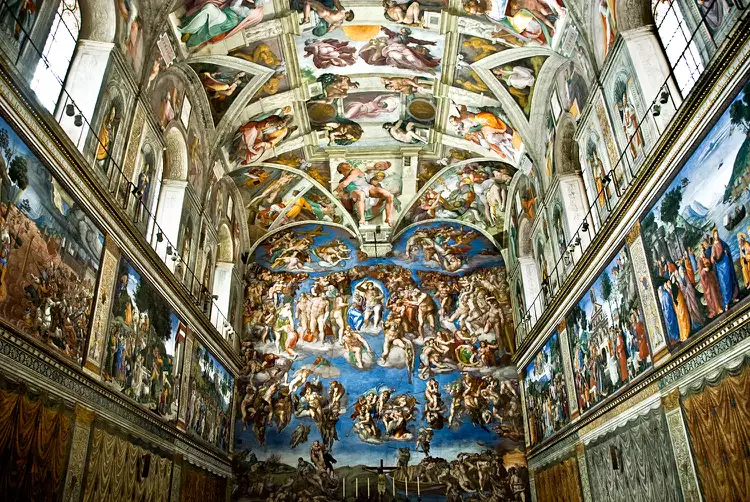Summary
The Vatican Museums house an extensive collection of artworks spanning from ancient to contemporary, including the iconic Sistine Chapel. A visit to the Vatican Museums often requires at least two hours; thus, having a well-thought-out plan is essential. Whether you are an art enthusiast eager to see works that have inspired you for years or an architecture lover wanting to explore detailed designs, planning will enhance your experience.
Visitors will find a diverse array of museums, from a lapidary museum to one featuring Egyptian artifacts, as well as a notable carriage museum and contemporary art collections. Therefore, it is crucial to tailor your visit according to your specific interests. Additionally, the Vatican’s official website features a current list of opening and closing times, which is invaluable for planning your visit.
Sistine Chapel
The Vatican Museums’ curators wisely placed the Sistine Chapel at the end of the museum tour as it is undoubtedly the high point of the visit. Here, you can marvel at the extraordinary artistry of Michelangelo’s ceiling and altar frescoes, not to mention works by other Renaissance masters such as Perugino, Botticelli, and Rosselli.
The Sistine Chapel was built on the foundation of an earlier chapel, known as the Capella Magna. In 1477, Pope Sixtus IV initiated a restoration of the chapel, which afterward was named in his honor.
Raphael Rooms
:max_bytes(150000):strip_icc():format(webp)/GettyImages-500055815-5930e0e85f9b589eb4d1a78a.jpg)
The Raphael Rooms are a must-see. Raphael painted the stunning frescoes in these four rooms—the apartments of Pope Julius II—during the same era that Michelangelo worked on the Sistine Chapel. The artwork features pivotal scenes from Christian history.
The most renowned of these rooms is the Room of the Segnatura, where Raphael created The School of Athens, which includes the likenesses of his contemporary artists, including Leonardo da Vinci and Michelangelo.
Borgia Apartment
:max_bytes(150000):strip_icc():format(webp)/GettyImages-607352000-5930e1d75f9b589eb4d1ae26.jpg)
The Borgia Apartment is adorned with elaborate frescoes painted by the artist Pinturicchio. These vibrant works adorn the first-floor rooms where Pope Alexander VI resided. The frescoes are rich in color and depict tales from Greek and Egyptian mythology, showcasing the opulence of the Vatican Palace.
Gallery of Maps
:max_bytes(150000):strip_icc():format(webp)/Vatican_City_map_EN-5930e3083df78c08ab575ba2.png)
This magnificent gallery features frescoed maps on both sides depicting various regions of Italy as they appeared in the 16th century. The frescoes capture significant Italian cities, landscapes, and geographical features, including the Apennine Mountains and the Tyrrhenian Sea. The gallery’s stunningly ornate coffered ceiling further enhances its beauty. Notably, the gallery re-opened in 2016 following comprehensive restoration.
Cappella Nicolina
:max_bytes(150000):strip_icc():format(webp)/GettyImages-629181884-5930e47f5f9b589eb4d1b7b5.jpg)
One of the most exquisite and colorful 15th-century frescoes can be found in the diminutive Niccoline Chapel. Named after Pope Nicholas V, who prayed here, this chapel is situated in one of the papal palace’s oldest sections.
Greek and Roman Antiquities
:max_bytes(150000):strip_icc():format(webp)/GettyImages-655041094-5930e5685f9b589eb4d1bcd9.jpg)
The Pio-Clementine and Gregorian Profane Museums dedicate themselves to the treasures of antiquity. Among the highlights are the Apollo del Belvedere, considered “a supreme ideal” of classical art; the Laocoön, a remarkable marble piece from the 1st century A.D.; the Belvedere Torso, a Greek sculpture dated to the 1st century B.C.; and the Discus Thrower, a 5th-century B.C. masterpiece showcasing a discus athlete in motion, along with a splendid array of Roman mosaics.
Vatican Museums Tours
:max_bytes(150000):strip_icc():format(webp)/VaticanMuseum7-b9abc795a91c479ca14f30aca9f338de.jpg)
Participating in a guided tour is an excellent strategy for navigating the extensive exhibits within the Vatican Museums.
Various tours are available, tailored to individuals, families, groups, religious pilgrims, and visitors with disabilities. Tours cover numerous areas, including museums, gardens, and archaeological zones, with some being guided for an enriching experience.
Tickets for entry to the Vatican Museums can be conveniently purchased online.




